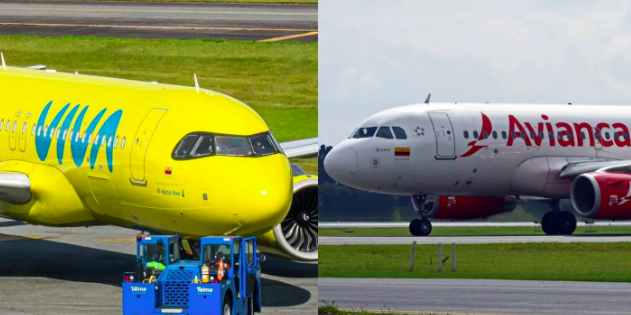By María C. Suárez
On one side is Avianca, which has stated that the conditions imposed by Aerocivil to integrate Viva Air are impossible to comply with.
On the other side is Viva Air, which only has exactly 12 days left to lose the protection provided by the corporate recovery process.
This means that the low-cost airline could go into liquidation.

For both companies, the Civil Aeronautics process, which officially began with the request made in August 2022, has taken too long and has further damaged the critical financial situation of Viva Air.
The airline suspended operations on February 27 and lost aircraft, employees, and capacity.
AMID THIS SCENARIO, WILL THE AIRLINES GIVE UP THEIR INTENTION TO INTEGRATE VIVA AIR?
Upon learning that Aerocivil confirmed its decision of conditional integration with Viva Air in response to the appeals for reconsideration of the case, Avianca warned that this is not a realistic transaction.
The airlines may or may not accept Aerocivil’s decision, but this decision is not final.
The reason is that through Resolution 00815, this authority resolved the appeals for reconsideration filed in the case by confirming the conditions already established.
However, this new Resolution is now subject to appeal.
From whom?
On the one hand, from the same companies involved in the process, i.e., Avianca and Viva Air, and on the other hand, from the interested third parties: JetSmart Airlines, Wingo, and Latam Airlines.
This instance adds more time to the process, in which Avianca expects the requested considerations to be taken into account against the conditions of the Aerocivil.
“Each day that passes in the process is one day less for Viva, its workers, and the entire value chain associated with its existence.”
“There is an increasing risk that lessors will withdraw the airline’s few remaining aircraft, making its operation unviable,” Avianca emphasized.
The airline is not only asking Aerocivil to act quickly but also to reconsider the conditions it established because, in its opinion, they make Viva’s operation unviable in the medium term, condemning it to be an operational and financial failure.
In addition, “these parameters are impossible to meet given the current reality of that company, which has already lost more than half of its aircraft”.
This is about maintaining capacity on exclusive routes despite lacking aircraft and slots (take-off and landing slots).
Avianca adds that the air authority’s decision grants unjustified benefits to third parties, such as requiring Avianca to pay for Satena’s IOSA certification.
“In all these cases, the conditions proposed by Aerocivil make it impossible for Viva to recover.”
PROSECUTOR’S OFFICE HAS BLAMED AEROCIVIL FOR DELAYING THE PROCESS
The Prosecutor General’s Office has stated that Aerocivil is delaying the Avianca-Viva integration due to the delay in responding to the appeals for reconsideration presented by the intervening companies and the third parties involved in the case.
Therefore, it asked this authority “not to delay the requirements made to the process (…) which will continue to affect not only the course of the integration of Avianca and Viva Air but also the benefit to passengers,” said the control entity.
In this case, the Prosecutor General’s Office had already issued warnings regarding possible errors in the administrative procedure of integration between the two airlines, specifically due to the intervention of interested third parties.

